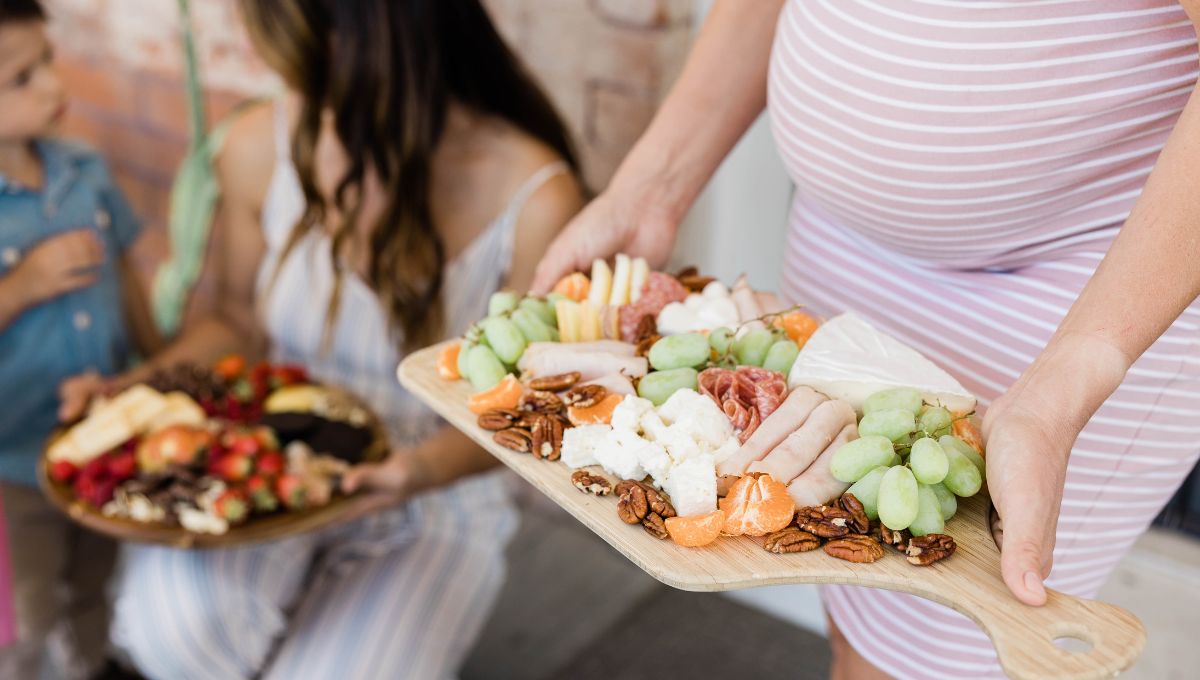
Can Pregnant Women Eat Charcuterie? Yes.
Charcuterie refers to cured or smoked meats like salami, prosciutto, and soppressata. Pregnant women need to be cautious about consuming these products as they carry certain health risks.
The curing process used to make charcuterie introduces compounds like nitrates, nitrites, and sodium that can be harmful in excess. There are also concerns over environmental contaminants like mercury that could be present.
While small amounts are likely safe, it’s important for pregnant women to understand the potential risks and make informed choices about their charcuterie consumption. This article provides an overview of the health concerns, safety recommendations, and options to continue enjoying these delicious meats.
Food Safety Risks
Pregnant women need to be cautious about consuming charcuterie due to some potential food safety risks. The main risks from deli meats are Listeria, Toxoplasma gondii, and Salmonella.
Listeria
Listeria is a type of bacteria that can contaminate deli meats. Pregnant women are 10 times more likely to get listeriosis from Listeria compared to the general population. Listeriosis can cause miscarriage, stillbirth, and illness or death in newborns.
Deli meats are more prone to Listeria contamination since they are often eaten without cooking. The bacteria can easily multiply in refrigerated ready-to-eat foods like deli meats. Proper food handling and cooking deli meats to 165°F can kill Listeria.
Toxoplasma gondii
Toxoplasma gondii is a parasite that causes toxoplasmosis. It’s often found in raw or undercooked meats. Toxoplasmosis in early pregnancy may lead to miscarriage or major organ damage in the fetus.
Cured/smoked meats may have a higher risk of toxoplasmosis. Freezing, cooking to safe temperatures, and avoiding cross-contamination can reduce the risk.
Salmonella
Salmonella is another bacteria that can contaminate deli meats, causing salmonellosis. Symptoms include nausea, vomiting, abdominal cramps, and diarrhea.
In pregnant women, salmonella infections can lead to premature delivery, infection of the fetus, and dehydration. Proper handling, cooking, and avoiding cross-contamination are key to reducing salmonella risk.
Nitrates/Nitrites
Nitrates and nitrites are commonly used as preservatives in cured and processed meats like charcuterie. While these compounds help prevent bacterial growth and give many charcuterie items their characteristic pink color, there are some potential health concerns associated with nitrates and nitrites for pregnant women.
Potential risks: When consumed, nitrates can be converted into nitrites in the body. Nitrites can then react with amino acids to form compounds called nitrosamines, some of which are known carcinogens. There’s particular concern about the risk of nitrosamine formation in the stomach. Studies suggest higher exposure to nitrosamines during pregnancy may increase the risk of brain tumors and leukemia in children. However, the evidence is not conclusive.
Studies on effects: The few studies that directly examined maternal nitrosamine exposure and childhood cancers had inconsistent results. Some found a relationship, while others didn’t. More research is needed to determine if there is a direct causal effect. The risks likely depend on the amount and frequency of nitrosamine exposure from sources beyond just charcuterie. Current evidence suggests occasional charcuterie consumption during pregnancy is unlikely to significantly increase cancer risks.
Sodium Content
Consuming too much sodium during pregnancy can lead to extra fluid retention and swelling. The recommended sodium intake for pregnant women is 1500-2000 mg per day. Processed deli meats like salami, ham, and bacon can have upwards of 1000 mg of sodium per serving. Eating these foods regularly could easily put you over the daily limit.
An excess of sodium may also increase swelling or bloating, especially in the face, hands, and feet. This is because sodium causes the body to retain more water. Swelling is common during pregnancy, but a high sodium intake makes it worse. If you already have swelling, be extra mindful of salty foods.
Some women are more sodium-sensitive than others and prone to swelling. Pay attention to how deli meats affect you. Do your fingers get puffy or do your shoes start to feel tight after eating them? Your body is telling you to cut back. Choose lower-sodium options and limit portions if you want to enjoy charcuterie safely. Drinking more water can also counterbalance the effects of sodium. Discuss your symptoms with your doctor and adjust your diet accordingly.
Mercury and Pregnancy
Mercury is a heavy metal that can be harmful in large amounts, particularly for pregnant women and developing fetuses. The primary source of mercury in our diet is from fish and seafood. Certain types of fish tend to have higher levels of mercury than others.
When pregnant women consume fish high in mercury, it can cross the placenta and affect the developing nervous system of the fetus. Some research has suggested that high mercury exposure in pregnancy may lead to issues with brain development, cognition, memory, attention, language, and motor skills later in childhood.
However, the American College of Obstetricians and Gynecologists states that moderate fish intake during pregnancy (2 servings per week) is safe and provides important nutrients like omega-3 fatty acids. They recommend avoiding fish with the highest mercury levels like tilefish, shark, swordfish and king mackerel. Seafood like shrimp, salmon, catfish and canned light tuna have lower mercury levels.
The mercury levels in other meats like poultry and pork are negligible. The FDA monitors mercury in foods and works to minimize mercury contamination. As long as pregnant women follow the guidelines on fish intake and avoid fish with high mercury levels, eating other meats and proteins like deli meats should not pose a mercury risk.
Deli Meat Alternatives
There are some great options out there for pregnant women looking for deli meat alternatives. Cooking a few homemade meat options is a safe choice and gives you full control over the ingredients. Baked chicken, pork loin, and meatloaf can all provide plenty of the protein found in deli meats without the added risks. Marinating meats in flavorful ingredients like garlic, herbs, citrus, and vinegars can give you delicious results. Always make sure meats are thoroughly cooked to the proper internal temperature to destroy any potentially harmful bacteria.
For vegetarians and vegans, hummus and avocado can provide the creamy texture of deli meats for sandwiches and wraps. Houmous is packed with protein and healthy fats. You could also try more plant-based proteins like seasoned tofu, tempeh, and roasted veggies with beans or lentils. Grilled portobello mushroom caps marinated in balsamic make great sandwich slices. For kids’ lunches, wider choices of vegan deli slices and meats are showing up on grocery shelves all the time. With a little creativity, you can find plenty of ways to get that charcuterie fix safely during pregnancy!
Can Pregnant Women Eat Charcuterie
Charcuterie can be safe for pregnant women if certain precautions are taken. Pregnant women should avoid cured deli meats high in nitrates and unpasteurized cheeses, which can contain listeria monocytogenes bacterium. However, cooked roast beef or turkey and pasteurized cheeses are safe to eat. Pregnant women can also enjoy a pregnancy-friendly cheese board by using hard cheeses and heating deli meat to 165 ℉ or until “steaming hot” before serving. It is important to be food-safe and food aware during pregnancy, and to consult with a healthcare practitioner if there are any concerns about specific foods.
Tips for Safe Consumption

When consuming charcuterie during pregnancy, there are some precautions you can take to reduce any potential risks.
Heating/Handling Precautions
- Thoroughly cook deli meats to steaming hot, at least 165°F. This helps kill any bacteria that could be present.
- Don’t let deli meats sit out at room temperature for more than 2 hours. Bacteria multiply quickly at temperatures between 40°F and 140°F.
- Separate raw meats from other foods to avoid cross-contamination. Use separate cutting boards and utensils.
- Wash hands, countertops, cutting boards, dishes, and utensils that have touched raw meats thoroughly with hot soapy water.
- Refrigerate promptly and maintain refrigerator temperature at or below 40°F.
Portion Sizes
- Limit portion sizes to no more than 2-3 ounces per serving.
- Spread out your intake over the course of a week rather than eating multiple servings in one sitting.
- Pair deli meats with healthier items like whole grain bread, lettuce, tomatoes, and avocado.
Following proper food safety practices and limiting your portions can help minimize risks when eating charcuterie while pregnant. Discuss any concerns with your doctor.
Benefits of Charcuterie
Charcuterie contains beneficial nutrients like protein, iron, zinc, and B vitamins that support maternal health and fetal development. While deli meats often get a bad rap for being processed, if chosen wisely they can be an excellent addition to a pregnant woman’s diet.
Nutrients in Various Meats
- Prosciutto is rich in iron, niacin, vitamin B6, vitamin B12, zinc and selenium. Its salt content helps replenish sodium levels.
- Salami provides protein, iron, niacin, vitamin B12 and monounsaturated fats. It also contains probiotics that support digestive health.
- Pepperoni is high in protein, zinc, iron, and vitamin B12. The sodium aids fluid balance.
- Capicola is loaded with iron, zinc, protein and B vitamins. It’s a little higher in fat but still leaner than many cuts of fresh meat.
- Pancetta is an excellent source of protein, niacin, vitamin B12 and monounsaturated fats. It also contains probiotics for gut health.
Lean Options
Choosing leaner deli meats can allow pregnant women to obtain all the benefits while limiting fat, sodium and nitrates. Good options include:
- Turkey breast
- Chicken breast
- Roast beef
- Ham
- Genoa salami
- Prosciutto
Selecting low-sodium varieties when possible also helps control sodium intake. Overall, charcuterie in moderation can be a tasty way for expecting mothers to get vital nutrients for their health and their baby’s development.
When to Avoid Charcuterie Entirely
Charcuterie can be enjoyed in moderation during pregnancy but there are some instances where it’s best to avoid it altogether.
- In the third trimester: As pregnancy progresses, the immune system weakens which makes women more susceptible to foodborne illnesses. Since deli meats carry a risk of listeria, it’s best to avoid them in the final trimester when listeria can be especially dangerous.
- Compromised immune system: Women with compromised immune systems due to other health conditions should also avoid deli meats to limit listeria exposure. This includes women with HIV/AIDS, cancer, diabetes, lupus and other autoimmune disorders.
- History of miscarriage or stillbirth: There is a suspected link between listeria infection and miscarriage/stillbirth. Women who have suffered previous fetal loss may want to avoid deli meats entirely when pregnant again.
- On bed rest: Women who are prescribed bed rest or limited activity during pregnancy will be especially vulnerable to foodborne illness. Complete avoidance of deli meats reduces the risk.
Doctor Recommendations
Many pregnant women want to know if their doctor recommends eating charcuterie while pregnant. Official guidelines vary, but most doctors agree that pregnant women should exercise caution with charcuterie and deli meats.
The risks from deli meats primarily come from the sodium/salt content and potential for Listeria contamination. Doctors suggest pregnant women take the following precautions:
- Avoid eating deli meats unless heated to steaming hot. The high heat kills any harmful bacteria.
- Limit your intake of processed meats to no more than 2 servings per week. This minimizes your sodium and nitrite exposure.
- Opt for low-sodium deli meat options whenever possible.
- Thoroughly wash hands, utensils, and surfaces after handling deli meats to avoid cross-contamination.
- Avoid deli meats from the refrigerated section at the grocery store, as these are more prone to Listeria. Opt for pre-packaged options instead.
- If you develop any symptoms like fever, muscle aches, or diarrhea after eating deli meats, call your doctor immediately.
Doctors agree that the overall risk from deli meats is low for most healthy pregnant women. Strictly avoiding deli meats may not be necessary, as long as you take precautions to minimize the risks. Discuss your specific concerns with your physician and follow their recommendations for safe charcuterie consumption during pregnancy.
Making a Decision
Eating charcuterie while pregnant ultimately comes down to assessing your own risk factors and determining what you feel comfortable with. Here are some things to consider:
- Evaluate your overall diet – Are you already eating plenty of processed and salty foods? Adding more may tip the scales. But if your diet is very clean otherwise, some deli meat in moderation is less likely to be an issue.
- Consider any conditions you have that could be aggravated by excess sodium, nitrates or nitrites. High blood pressure, for example. It’s wise to avoid deli meats if you have hypertension.
- Are you experiencing normal pregnancy symptoms like nausea and food aversions? If so, charcuterie may not sound appetizing anyway right now. It’s usually fine to listen to your body’s cues.
- Think about your own risk tolerance. If you will worry excessively and feel anxious eating deli meats, then it’s better to avoid. But if you can eat them in moderation without significant stress, that’s a reasonable choice too.
- Discuss it with your doctor and follow their guidance based on your medical history and current pregnancy health. Some may say to avoid completely while others may give the okay for an occasional indulgence.
Moderation is key if you do choose to incorporate some charcuterie. Stick to just 1-2 times per week rather than daily deli meat consumption. Opt for lower sodium options and pair with fruits, vegetables and whole grains for balance. Ultimately this is a personal choice that requires looking at the evidence, assessing your unique situation and risks, and deciding what feels right for you and your baby.












